
Unisa has officially kickstarted the two-day Catalytic Niche Area (CNA) Research Symposium taking place on 14 and 15 August at the Muckleneuk Campus, Tshwane.
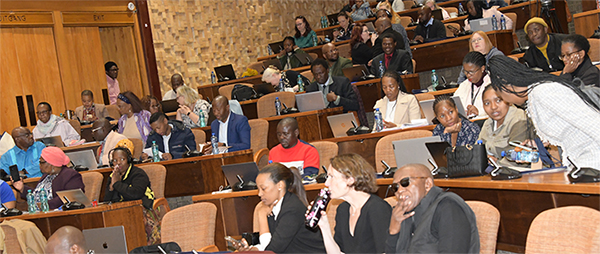
The symposium is coordinated by Prof Les Labuschagne, Executive Director of Research, Innovation and Commercialisation. This symposium will see top industry leaders and experts from various national and international organisations, and institutions knowledgeable in the various identified niche areas, deliberate on expanding their research and conceptualisation, with the aim of developing innovative strategies and groundbreaking methods to contribute to knowledge creation, address societal challenges and position the university as a global leader in these highly specialised fields of study.
The CNAs were identified soon after Prof Puleng LenkaBula, Unisa Principal and Vice-Chancellor (PVC), assumed duty as the first female PVC of the university. The PVC embarked on a research-driven initiative to pinpoint specific academic domains capable of propelling the university's scholarly pursuits forward. The CNAs were envisioned to not only invigorate and elevate Unisa's academic focus but also enrich the academics’ experiences as engaged scholars.

From left: Prof Thenjiwe Meyiwa, Vice-Principal: Research, Postgraduate Studies, Innovation and Commercialisation; Prof Les Labuschagne, Executive Director: Research, Innovation and Commercialisation; and Prof Tennyson Mgutshini, Executive Dean: College of Graduate Studies
In her opening and welcome remarks, Prof Thenjiwe Meyiwa, Vice-Principal of Research, Postgraduate Studies, Innovation and Commercialisation, said that when the university introduced the concept of the CNAs, it received mixed reactions ranging from positivity and interest to uncertainty, surprise and scepticism. "In some cases," she continued, "people looked at the CNAs and wondered how they would fit into Unisa’s comprehensive open, distance and eLearning (CODeL) teaching and learning modality. Marine studies, for example, puzzled some because it could not be considered a core discipline, similar to the inclusion of aviation, aeronautical and automotive studies, among others. However, as time passed and efforts gained momentum to unpack and raise awareness about the niche areas within the university’s community, levels of acceptance rose."
Meyiwa pointed to the latest national unemployment figures, which are at 33.5%, translating into 8.4 million jobless South Africans: "The possibility of making a huge impact on job creation," she said, "adds to the litany of reasons why the university adopted the CNAs."
Concluding her message, Meyiwa appealed to the audience to engage in innovative thinking in such a way that every researcher, administrator, professional and technical staff member will own the CNAs, and actively think of and strategise towards their realisation.
Prof Tennyson Mgutshini, Executive Dean of the College of Graduate Studies, which is responsible for the portfolio that oversees the coordination and operationalisation of the CNAs, gave context on what the symposium is meant to do.
Mgutshini stated that some of the CNAs have stand-out characteristics, while some exist by virtue of being historical areas where there has been a legacy of under-representation of equity priority groups. "The university identified them so that this anomaly can be addressed and that there may be an upward mobility of specific society groups," he explained.
"Some of the CNAs," he continued, "represent specific societal priority areas, such as health sciences. We have been tested in these areas, for example, the Covid-19 pandemic differentiated between countries that were ready to deal with it and countries that were not."
For universities to reach a specific pedigree, explained Mgutshini, they need to have specific research and curriculum development agendas. "Therefore," he said, "the CNAs propel us towards that. The greatest universities are characterised with specific niche areas instead of being jacks-of-all-trades."
Mgutshini underscored the significance of some of the CNAs, revealing that they represent disciplines that have the highest level of grant opportunities available. "And when we focus on those," he continued, "we open up a new potential income stream for the university, researchers and graduates. Some CNAs are groundbreaking areas. If we prioritise developing graduates to become experts in these fields, they will walk out of the university as producers of employment or walk in spaces that are avant-garde."
Concluding his address, Mgutshini underpinned the optimisation of the CNAs, adding that this will involve working with others in various disciplines and looking for opportunities for multi, inter, and transdisciplinary infusions of the different niche areas. He further explained: "We may have one or two people who are in fields that may have very little or no connection to the niche areas, but through multi, inter and transdisciplinary capacitation, they are able to find ways to infuse the CNAs into their discipline."
In his keynote address, Prof Tankiso Moloi, Chair of 4IR Initiatives at the University of Johannesburg, spoke on The Fourth Industrial Revolution, future careers and the role of higher education institutions. He began by recounting the history of the various industrial revolutions. "The first was characterised mainly by the rise of steam engines, and the second by the discovery of electricity. This was followed by the third revolution – the electronic age characterised by phones, television and computing equipment."
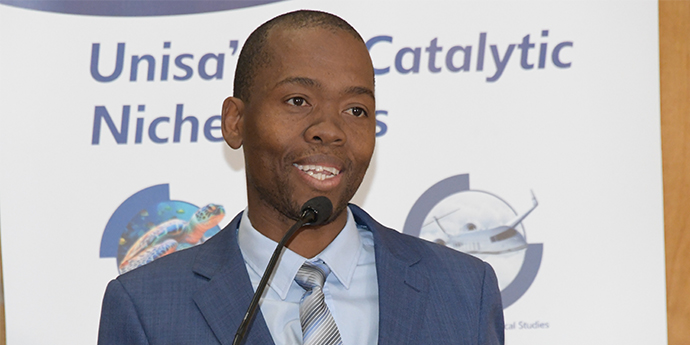
Prof Tankiso Moloi, keynote speaker and Chair of 4IR Initiatives at the University of Johannesburg
Moloi described the Fourth Industrial Revolution (4IR) as a confluence of cyber, physical and biological technologies characterised by technologies such as artificial intelligence (AI), robotics and the internet of things (IoT). In addition, he stated that 4IR is AI-dominant, whereby machines can self-learn, diagnose, repair and make their own decisions without human intervention.
Regarding future careers, Moloi stated that digital giants such as Facebook are already trading user data as currency for profit to advertisers and financial institutions – an indication, he said, that data is becoming a valuable commodity.
"Automation," he said, "is expected to impact work in a series of three waves. The first wave, in early 2030, will be impacted by algorithms, the second by augmentation, and the third by autonomy."
Moloi stated that the focus of higher education institutions should be to restructure qualifications to allow for adaptation, and the rapid development of micro degree/micro credentials as viable, flexible and responsive learning opportunities. "These institutions," he said, "should consider introducing technical multidiscipline and non-technical courses and problem-based learning into the curricula and, in addition, promote continuous learning for professionals through reskilling and upskilling."
While indicating the suggestions that higher education institutions must consider, Moloi additionally posited potential risks involving the use of AI, which include ethics, cyber security, privacy, misinformation, concentration of power by those who run AI corporations, economic inequalities, and failure to harness intellectual property, among others.
Concluding his remarks, Moloi stated that in order to embrace 4IR with its challenges and opportunities, they should remain fluid instead being too static and rigid. "The future is fluid, to and to remain relevant one must be formless and shapeless," he said.
As the symposium continues on 15 August 2024, participants will delve deeper into the potential of the CNAs, and explore opportunities for collaboration and knowledge exchange. The event is expected to produce significant insights and lay the groundwork for future research initiatives.
* By Godfrey Madibane, Acting Journalist, Department of Institutional Advancement
** Photography by Shooheima Champion, Multimedia Centre
Publish date: 2024-08-14 00:00:00.0
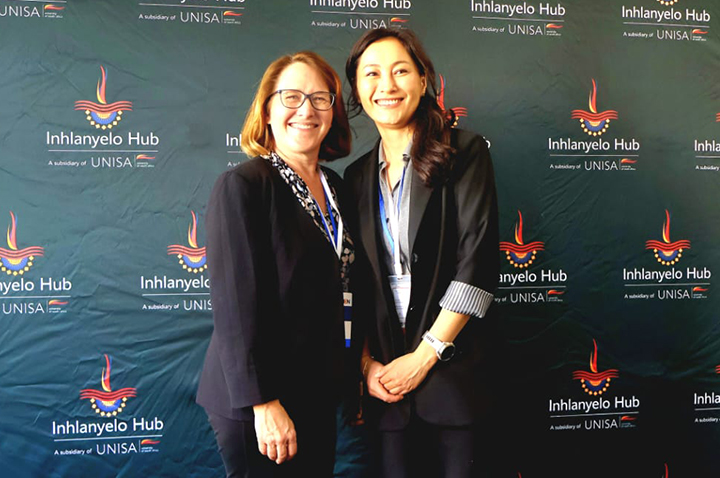 Unisa roundtable focuses on empowering SA women to lead in innovation
Unisa roundtable focuses on empowering SA women to lead in innovation
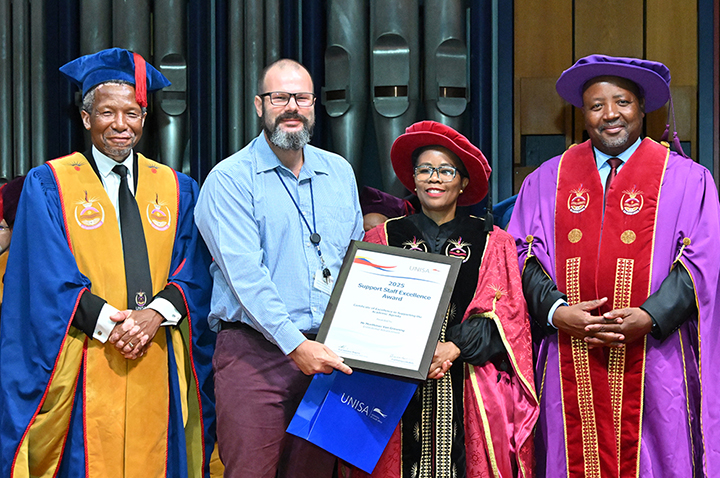 Unisan recognised for web excellence
Unisan recognised for web excellence
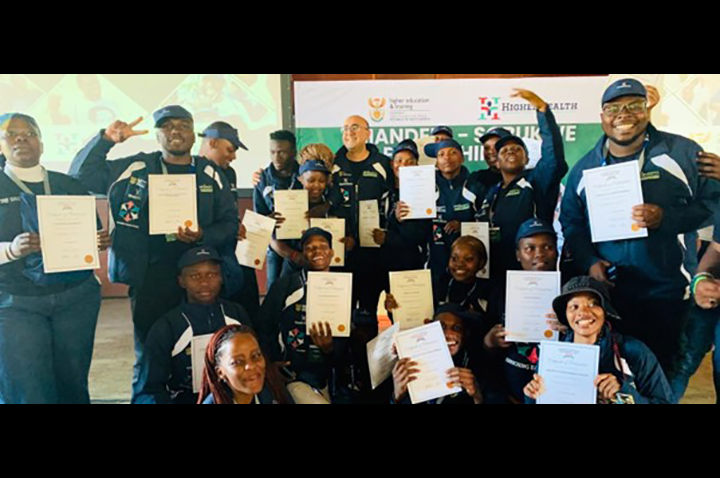 Office of the Dean of Students participates in leadership camp
Office of the Dean of Students participates in leadership camp
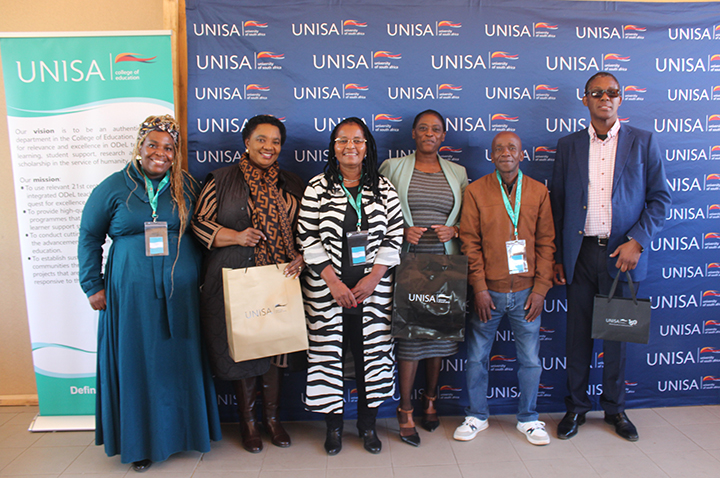 Unisa project fosters digital and pedagogical innovation in Limpopo schools
Unisa project fosters digital and pedagogical innovation in Limpopo schools
 Unisa student wins prestigious national leadership award
Unisa student wins prestigious national leadership award